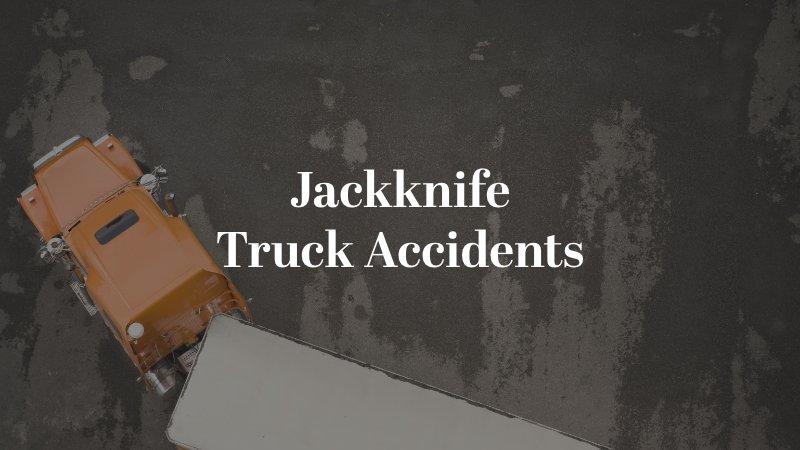Jackknife accidents are no laughing matter. Large trucks, moving uncontrollably at dangerous speeds, usually result in severe injuries and catastrophic property damage. If you’ve been injured in a jackknife truck accident, help is available.
Our Denver trucking accident attorneys have helped many jackknife accident victims receive high settlements and jury verdicts.

What is a Jackknife Truck Accident?
A Jackknife is a common type of accident when the cab and the attached trailers on 18-wheelers cease moving in harmony. The trailer can veer to the side of the cab, forming a shape that resembles a jackknife or the letter V.
Once the trailer veers to the side, the large truck becomes uncontrollable, potentially destroying everything in its past and becoming a hazardous obstacle for other motorists.
What Causes Jackknife Truck Accidents?
Jackknife truck accidents can happen quickly, catching unsuspecting drivers off-guard with devastating results. Abrupt braking, turning too quickly, and unsecured loads can lead to the dreaded jackknife shape forming on the roadway. Understanding high-risk conditions and what to watch out for can help motorists avoid being involved in Jackknife accidents.
Unsecured Cargo
Unsecured cargo is a leading cause of jackknife accidents. When cargo comes loose and rapidly shifts, it can slam against the truck’s trailer, causing a Jackknife. Negligent employers who fail to train their employees on securing loads properly are often at fault in these situations.
Speeding
Ruck drivers are often under pressure to deliver their loads quickly. As a result, they report speeding on the roadway. Driving large trucks too fast may cause the cab to lose control of its load.
Road Conditions
Weather is a top cause of jackknifes. Intense storms may create slick conditions, which make it harder for truck drivers to control their vehicles. Road hazards like unrepaired potholes can also increase the likelihood of a jackknife accident.
Driver Error
Truck drivers are often to blame for jackknife truck accidents. Fatigued or inexperienced drivers can lose focus of their task and control of their vehicle. When operating heavy machinery like 18-wheelers, a slight mistake can have significant consequences.
Driver error is especially prevalent for truck drivers under the influence of alcohol and other substances.
What Types of Injuries Do Jackknife Accidents Cause?
Due to the sheer force generated during Jackknife accidents, serious injuries often result. While some are fortunate enough to leave these accidents unscathed, many suffer lasting injuries that significantly decrease their quality of life.
Whiplash
Whiplash results from sudden, forceful movements of the neck and head. The force may damage muscles, ligaments, and disks in the neck. Many unpleasant whiplash symptoms include neck pain, headaches, numbness, and dizziness.
Traumatic Brain Injury
Traumatic Brain Injuries occur when the head is struck. TBIs can damage communication between nerve cells in the brain and cause chemicals to be released, causing further damage. TBIs may be temporary or permanent.
Other Physical Injuries
Impact force, explosions, and debris are a recipe for disaster. Broken bones, internal injuries, burns, and lacerations are all common injuries resulting from jackknife accidents. Some of these injuries lead to life-threatening conditions like internal bleeding and severe burns.
Get Legal Help Today
If you’ve been injured in a Jackknife truck accident, legal help is available from our Denver injury lawyers. At Dulin McQuinn Young, we have over two decades of unparalleled experience helping truck accident victims receive the compensation they deserve.
Contact us today, and we’ll respond within 24 hours to discuss your case.